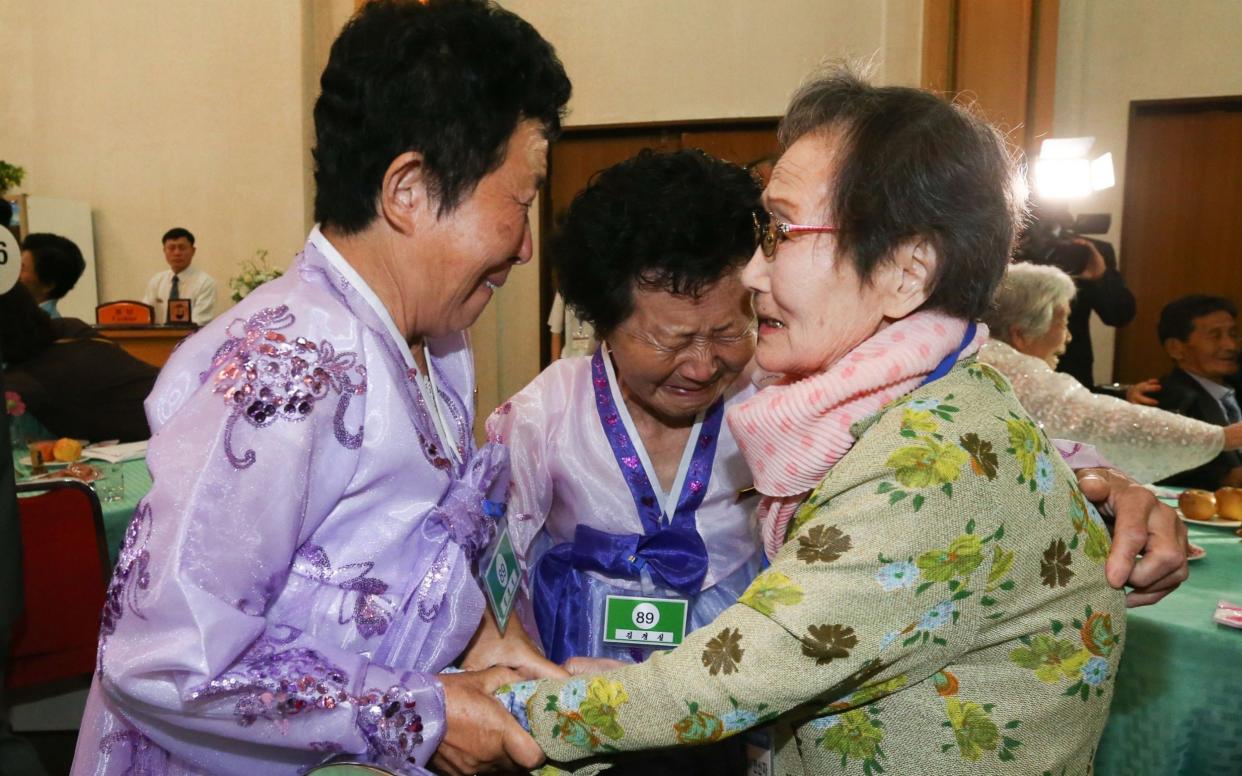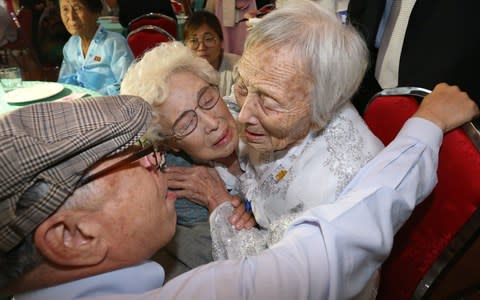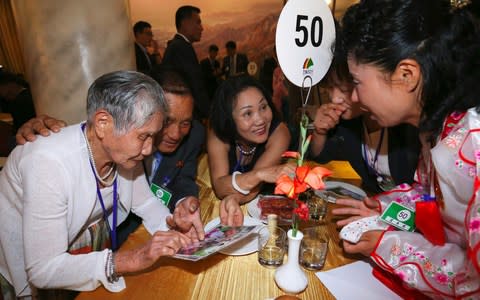Korean families separated by war meet for first time in more than sixty years

There were tears and embraces on Monday as some 90 families from the two Koreas were reunited in the North after being torn apart for more than six decades by the 1950-53 Korean War.
The families have been given the rare opportunity to meet again amid a diplomatic thaw between Seoul and Pyongyang that saw the leaders of the two countries meet in April for a historic first summit.
The emotional reunions will take place over three days but relatives will only be given 11 hours to catch up on decades of lost time. For many, the experience has already proven to be overwhelming.
Kim Kyong Sil and Kyong Young, 72 and 71, wearing light violet traditional dress of hanbok, stood nervously staring at the entrance before their 99-year-old mother Han Shin-ja turned up. For several minutes they could only wail loudly as they rubbed their cheeks and hands.
"When I fled home in the war," said Han finally but failed to continue as she choked up with emotions, reported Reuters.

Many of the elderly participants turned up in wheelchairs. Among the group who travelled North was a 101-year-old man.
Baek Sung-gyu, 101, who will meet his daughter-in-law and granddaughter from the North, was one of the lucky few selected from more than 57,000 South Korean war survivors who registered for the chance to see long-lost loved ones.
The reunion, the first in three years, could be the only chance for many separated families to meet again face-to-face after being kept apart by decades of animosity between North and South that has been fuelled by Pyongyang’s rapidly advancing nuclear weapons programme.
“I’m over 90 so I don’t know when I am going to die. I am very glad that I have been selected this time, I’m walking on air now,” Moon Hyun-sook, 91, told Reuters before she boarded the bus that would take the group across the heavily fortified border to the North’s Mount Kumgang tourist resort.

Many are taking gifts like clothes, medicine and food for their relatives in the impoverished North.
“I’ve prepared for him some household medicine including digester and headache pills, nutritional supplments as well as some daily necessities,” added Lee Soo-nam, 76, who was due to meet his older brother.
For some separated relatives, the reunion has already come too late.
Chung Hak-soon, 89, had dreamt her whole adult life of being reunited with her older brother, only to find out that he passed away several years ago.
"I really wished to see even the face of my brother, but the reunion has come too late," she told the Yonhap news wire. Instead, like others on the trip, she will meet family who she has never seen before.

This week's event is the first of its kind since October 2015. The two Koreas have held just 20 rounds of face-to-face family reunions since the first-ever inter-Korean summit in 2000. The precious 11 hours will be spent under heavy supervision. The meetings can be traumatic and farewells are set to be painful.
Many thousands of Koreans, in the twilight of their lives, have already been left heartbroken after failing to make it through the tough selection process.
They are the last surviving remnant of millions of people who were forcibly separated from loved ones without warning after the Korean peninsula was permanently divided between North and South by a so-called demilitarised zone (DMZ).

Some who have been excluded from the arbitrary process have denounced the reunion as a “cruel” political show that only causes more pain for divided families and demanded faster progress to allow more families to be reunited again.
For years, Seoul has been calling for regular meetings between separated families including using video conferences, but the South’s efforts have been blocked by fragile relations with Pyongyang.
“They only let us see each other for a short time and separate us again. It’s like putting a dagger through our hearts,” Lee Myung-sik, 84, told the Telegraph. He will not take part in this week’s event.
Mr Lee escaped as a young man from the border town of Kaesong when his father was shot by soldiers who accused him of being anti-Communist.

The last time he saw his family he had been asked by his father to retrieve money he had loaned to a neighbour. “I just told him that I would be back soon because it was only down the road. As soon as I walked into the neighbour’s house I heard a gunshot. My neighbour told me that people came to my house to arrest me so I ran away,” he said.
After decades of being unable to even send a letter home, Mr Lee has little time for political gestures.
“It’s just telling us to die in peace after seeing our separated family for a short time. It’s more cruel than murder, they need to let us stay in touch,” he said.
Kim Geum-ok, 86, who also missed out on the reunion, said she had fond memories of a happy childhood before she was suddenly forced to leave her parents, grandparents and cousins behind at the age of 18 when northern forces overran Kaesong in 1950.
“My parents told me to leave Kaesong for a short time and come back when the South Korean soldiers took it back. We thought that the war would be over soon,” she said.
“I was actually quite excited to go to Seoul because my mother’s brother lived there. We all thought everything would return to normal in a few days. That was the last time I saw my parents,” she said. “My only wish is to go back to Kaesong and see my hometown,” she said.

